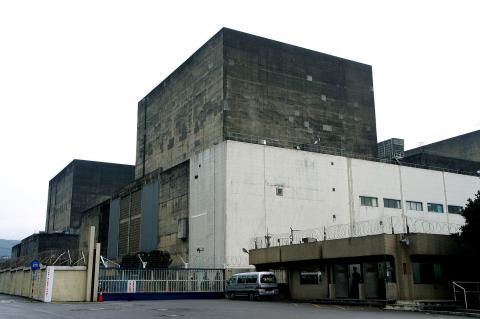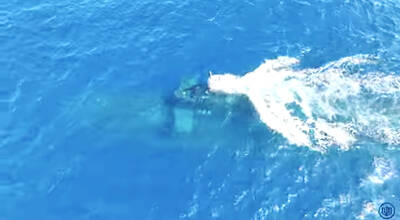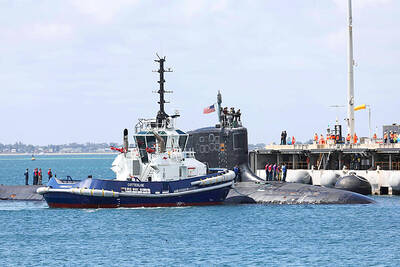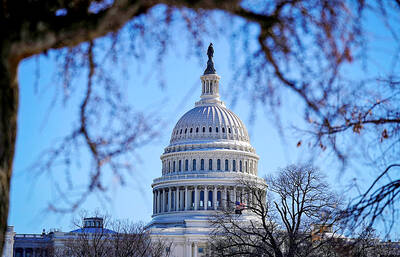North Korea has filed a transnational lawsuit against Taiwan Power Co (Taipower, 台電), accusing the state-owned utility of failing to honor a contract to deliver nuclear waste for disposal in the communist state, a local magazine reported.
The Chinese-language TVBS Weekly said in its latest issue yesterday that Taipower and the Pyongyang government signed a contract in 1996 that North Korea would take in the company’s nuclear waste.
However, because of international pressure — especially from the South Korean and US governments — Taipower called for a temporary suspension of the agreement in 1998, but later signed a new US$8.72 million deal with the North Korean government to extend the contract by five years, the report said.

Photo: EPA
Under the new deal, North Korea would continue investing and constructing nuclear waste disposal sites. However, since Taipower has not followed up on the deal, Pyongyang filed a transnational lawsuit against Taipower and asked for NT$300 million (US$10.1 million) in compensation, the report said.
Taipower issued a statement last night saying it did sign a contract with the North Korean government in 1997, promising to deliver low-level radioactive waste to the country for final management.
However, the two parties ran into difficulties that prevented them from carrying out the terms of the contract, Taipower said.
Taipower said that as of yesterday, it had not received any document stating that Pyongyang was seeking compensation for breach of contract.
The state utility said it was planning to deliver 60,000 barrels of low-level radioactive waste to a then-existing and still operating disposal site in North Korea, as promised in the contract signed on Jan. 11, 1997.
After the contract was signed, North Korea issued a permit allowing Taipower to export nuclear waste to the country.
However, North Korea failed to meet Taiwan’s Atomic Energy Council’s request that it follow the Taiwanese government’s rule of “finishing construction first prior to a site evaluation.”
Taipower also failed to obtain a permit from the AEC to export nuclear waste overseas.
Taipower added that the North Korean government had once sought mediation in 2004 from the AEC, but the two sides failed to reach a consensus.
The company said it did not wire any payment to the North Korean government because the contract never went into effect and had become invalid.

CSBC Corp, Taiwan (台灣國際造船) yesterday released the first video documenting the submerged sea trials of Taiwan’s indigenous defense submarine prototype, the Hai Kun (海鯤), or Narwhal, showing underwater navigation and the launch of countermeasures. The footage shows the vessel’s first dive, steering and control system tests, and the raising and lowering of the periscope and antenna masts. It offered a rare look at the progress in the submarine’s sea acceptance tests. The Hai Kun carried out its first shallow-water diving trial late last month and has since completed four submerged tests, CSBC said. The newly released video compiles images recorded from Jan. 29 to

DETERRENCE EFFORTS: Washington and partners hope demonstrations of force would convince Beijing that military action against Taiwan would carry high costs The US is considering using HMAS Stirling in Western Australia as a forward base to strengthen its naval posture in a potential conflict with China, particularly over Taiwan, the Wall Street Journal reported on Saturday. As part of its Indo-Pacific strategy, Washington plans to deploy up to four nuclear-powered submarines at Stirling starting in 2027, providing a base near potential hot spots such as Taiwan and the South China Sea. The move also aims to enhance military integration with Pacific allies under the Australia-UK-US trilateral security partnership, the report said. Currently, US submarines operate from Guam, but the island could

RESTRAINTS: Should China’s actions pose any threat to Taiwan’s security, economic or social systems, China would be excluded from major financial institutions, the bill says The US House of Representatives on Monday passed the PROTECT Taiwan Act, which states that Washington would exclude China from participating in major global financial organizations if its actions directly threaten Taiwan’s security. The bill, proposed by Republican Representative Frank Lucas, passed with 395 votes in favor and two against. It stipulates that if China’s actions pose any threat to Taiwan’s security, economic or social systems, the US would, “to the maximum extent practicable,” exclude Beijing from international financial institutions, including the G20, the Bank for International Settlements and the Financial Stability Board. The bill makes it clear that China must be prepared

Taiwanese trade negotiators told Washington that Taipei would not relocate 40 percent of its semiconductor production to the US, and that its most advanced technologies would remain in the nation, Vice Premier Cheng Li-chiun (鄭麗君) said on Sunday. “I told the US side very clearly — that’s impossible,” Cheng, who led the negotiation team, said in an interview that aired on Sunday night on Chinese Television System. Cheng was referring to remarks last month by US Secretary of Commerce Howard Lutnick, in which he said his goal was to bring 40 percent of Taiwan’s chip supply chain to the US Taiwan’s almost